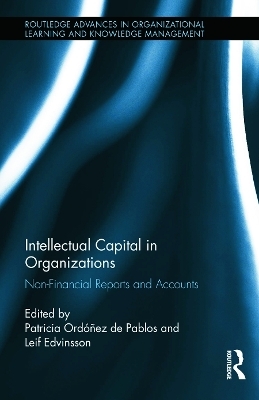
Intellectual Capital in Organizations
Routledge (Verlag)
978-0-415-73782-1 (ISBN)
This book reviews the development of the field of intellectual capital reporting, including core concepts, latest developments, the main components of intellectual capital, how a statement is built, and key indicators of each component. It further analyzes experiences from a variety of pioneering companies and institutions around the globe in measuring intellectual capital, including case studies from educational and research institutions, and provides crucial transnational comparisons. Authors Ordóñez de Pablos and Edvinsson examine the challenges and next steps for the harmonization of intellectual capital reports, consider the creation of a special international agency for intellectual capital reporting standards, and evaluate the weaknesses of current standards and how they might be overcome.
Patricia Ordóñez de Pablos is Professor in the Department of Business Administration and Accountability in the Faculty of Economics at the University of Oviedo, Spain. Her teaching and research interests focus on the areas of strategic management, knowledge management, intellectual capital, and China. She serves as an Associate Editor for the Behaviour and Information Technology journal and is Editor-in-Chief of the International Journal of Learning and Intellectual Capital and the International Journal of Strategic Change Management. Leif Edvinsson is Professor of Intellectual Capital at Lund University, Sweden and Chair Professor at Hong Kong Polytechnic University. He is a key pioneering contributor to both the theory and practice of intellectual capital. He is the author of numerous journal articles on service management and intellectual capital, and in 1997 co-authored (along with Michael S. Malone) one of the first books on intellectual capital. He serves as special advisor on Societal Entrepreneurship to the Swedish Governmental Foundation for Competence Development and to the Swedish Governmental Agency for Innovation.
Part I: Knowledge-Based Resources as the Basis for Competitive Advantage for Countries and Regions 1. Identifying Knowledge-Based Factors Supporting Regional Development. Theoretical Frameworks and Systems of Indicators Giovanni Schiuma and Antonio Lerro 2. A New Theory of Value: The New Invisible Hand of Altruism Thomas J. Housel, Wolfgang Baer and Johnathan Mun Part II: The Importance of Measuring Knowledge-Based Resources 3. Towards Measurement of Intangible Capital: Assessment of the Methods Presented by Baruch Lev Pirjo Ståhle and Sten Ståhle 4. Intellectual Capital Disclosure and Market Valuation Abdifatah Ahmed Haji and Nazli Anum Mohd Ghazali Part III: Intellectual Capital Reports in Europe 5. Intellectual Capital Statement as a Strategic Management Tool – The European Approach Markus Will 6. The Overview of IC Reporting Models within Serbian Industries Sladjana Cabrilo 7. Shaping New Managerial Models for European Universities: The Impact of Reporting and Managing IC Susana Elena Perez, Karl Heinz Leitner, Giustina Secundo and Žilvinas Martinaitis Part IV: Intellectual Capital Reports in Asian Institutions 8. A Knowledge Management Approach to Intellectual Capital Reporting in Hong Kong Rongbin W.B. Lee and Jessica Y.T. Yip 9. Reporting on Intangibles: A Recent Survey from Japan Tadanori Yosano 10. IC in Japan: Governmental Guidelines, Financial Market Perceptions and Company Practice Ulf Johanson and Chitoshi Koga Part V: Intellectual Capital in Latinamerica 11. Innovation and Intangibles: The Challenges of Brazil Marcos Calvalcanti and André Pereira Neto 12. Evaluating Intangibles Assets and Competitiveness in Brazilian Firms: The BNDES’s Approach Helena Tenório Veiga de Almeida and Joao Paulo Carneiro H. Braga Part VI: Asian versus Western Approaches on Intellectual Capital Reports 13. Varieties of Capitalism vs. Varieties of ‘Soft Regulatory’ Theories: A Discussion on the Case of Intangibles Reporting in Japan and Germany Laura Girella and Stefano Zambon Part VII: Trends and Challenges for Intellectual Capital Reports 14. Trends and Challenges of Future IC Reporting: Experiences from Japan Jun Yao and Erik Bjurström 15. Trends and Challenges for Intellectual Capital Eunika Mercier-Laurent
| Erscheint lt. Verlag | 23.1.2015 |
|---|---|
| Reihe/Serie | Routledge Advances in Organizational Learning and Knowledge Management |
| Zusatzinfo | 38 Tables, black and white; 38 Line drawings, black and white; 76 Illustrations, black and white |
| Verlagsort | London |
| Sprache | englisch |
| Maße | 152 x 229 mm |
| Gewicht | 589 g |
| Themenwelt | Geisteswissenschaften ► Psychologie ► Allgemeine Psychologie |
| Geisteswissenschaften ► Psychologie ► Arbeits- und Organisationspsychologie | |
| Wirtschaft ► Betriebswirtschaft / Management ► Personalwesen | |
| Wirtschaft ► Betriebswirtschaft / Management ► Planung / Organisation | |
| Wirtschaft ► Betriebswirtschaft / Management ► Rechnungswesen / Bilanzen | |
| Wirtschaft ► Betriebswirtschaft / Management ► Unternehmensführung / Management | |
| Wirtschaft ► Volkswirtschaftslehre | |
| ISBN-10 | 0-415-73782-6 / 0415737826 |
| ISBN-13 | 978-0-415-73782-1 / 9780415737821 |
| Zustand | Neuware |
| Informationen gemäß Produktsicherheitsverordnung (GPSR) | |
| Haben Sie eine Frage zum Produkt? |
aus dem Bereich


